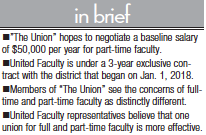Instructor calls for alternate labor union
Part-time professors seek representation
May 1, 2018
A handful of adjunct professors from sister college Diablo Valley, in Pleasant Hill, are in the early stages of organizing a part-time faculty union to better represent their concerns throughout the Contra Costa Community College District.
Although the United Faculty is the exclusive representative under a three-year contract for both full-and part-time faculty members throughout the district, the Part-time Faculty Union of the CCCCD is slated to operate as its own entity.
Founded by DVC political science professor Jeremy Cloward, the makeshift union met Friday to accept administrative roles and discuss future plans.
Other founding members include DVC history professors Katie Graham and Nolan Higdon and political science professors John Kropf and Martin Duwe.
“In the end, the UF can’t solve our problems,” Cloward said. “That union represents two separate groups of workers with distinct sets of concerns and the bottom line is that likely the only way we will get what we want is to force an outcome with the district through a ‘strike.’”
Cloward said a strike is something that none of the founders believe thefull-time faculty will do because it is simply not their fight.
In an email sent out on April 16, addressed to all district employees, Cloward details the plight of part-time faculty throughout the nation and the objectives of the newly formed union.
“While we do not see ourselves as the ‘leaders of the union,’ we are accepting responsibility for the initial formation of the Part-Time Faculty Union of the CCCCD. Or simply — The Union,” Cloward states in the email.
“In the end, no one wants to ‘form a union’ and confront the district or state. We just want a job that provides a decent wage in our chosen profession so we can provide for our families.”
One main objective of The Union is the fight for a living wage with benefits.
This includes a negotiated salary of $50,000 a year regardless of how many courses are taught by a professor and benefits paid in full by the district.
In order to join, however, Cloward said, members must agree to strike, if The Union votes to do so, with a 51 percent majority.
Members must also agree to recruit one other person into the Part-Time Faculty Union of the CCCCD.
“In addition to ‘the strike,’ a union’s real power is in its numbers,” Cloward said.
“The bigger and more daring we are the greater the chance at success we will have.”
Contra Costa College United Faculty Vice President Jeffrey Michels said that the United Faculty represents roughly 1,500 professors in the CCCCD and just because five of them went online and announced they are forming a new union doesn’t necessarily reflect a movement in that direction.

“I would be surprised if there’s much interest in the idea of separating into two unions,” Michels said. “I’ve never seen any evidence that that’s a good idea. The sentiment that led to that announcement is totally understandable and I think many of us, even full-time faculty, share that sentiment.”
Michels said because United Faculty negotiates the same contracts at the same time, the procedures are the same for both for full- and part-time faculty.
“I profoundly disagree with the idea that United Faculty doesn’t or can’t represent part-time faculty,” Michels said. “I think we fight very hard for part-time faculty. Part-time faculty, not just in our district, but in our system, in our state, in our nation are the most exploited group of employees among the faculty. So trying to improve pay and working conditions is always on the table.”
However, with the district’s three-year contract, which went into effect Jan. 1, 2018, the United Faculty is the exclusive representative of faculty in the district.
“Anybody can create, join, quit any association they want. But to represent faculty in collective bargaining at a California community college, one must have been chosen by the majority of the membership that works through the Public Employee Relations Board,” Michels said.
“While we are in a contract, it would be a contract violation and unfair labor practice if the district would meet and confer with any group other than United Faculty related to issues of collective bargaining.”
Cloward, who also led a push in 2015 for a part-time union, said that it failed because “we were neither united on the criteria for joining the union nor on what we wanted.”
DVC United Faculty Vice President Donna Wapner said it’s hard when discussing a “part-time union” because of the binding contracting between the district and United Faculty.
“My perspective is a united voice of adjunct and full-time faculty is the best way to deal with employee and faculty issues with the district,” she said.
“As one union we can represent faculty as a whole and at the same time call out the special needs of any individual group.”

